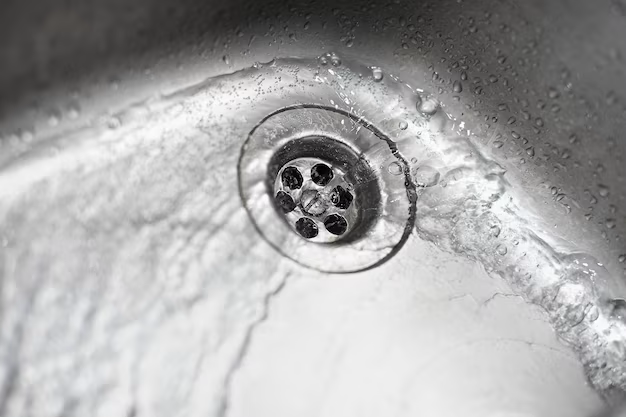Sulfuric acid drain cleaner not working
Overview
When it comes to clearing clogged drains, many homeowners turn to chemical drain cleaners like sulfuric acid drain openers. But what happens when these powerful chemicals fail to do the job? In some cases, using a sulfuric acid drain cleaner may not be effective due to a variety of reasons.
One reason sulfuric acid drain cleaners may not work is if the clog is caused by organic matter. This can include hair, food scraps, or other materials that are not easily dissolved by the strong acids in drain cleaners. In some cases, these organic materials may even react with the chemicals in the drain cleaner to create a solid mass, making the clog even worse.

Overall, while sulfuric acid drain cleaners can be effective for some types of clogs, they may not be the best solution for all situations. It is important to consider the potential risks and alternative methods when deciding how to clear a clogged drain.
What is sulfuric acid?
Sulfuric acid is a highly corrosive and strong acid that is commonly used in various industrial processes and household products. It is a colorless, odorless, and oily liquid that is soluble in water. Sulfuric acid is often referred to as the “king of chemicals” due to its high reactivity with many substances and its widespread use in various industries.
Chemically, sulfuric acid is composed of sulfur, oxygen, and hydrogen atoms. The molecular formula for sulfuric acid is H₂SO₄, which means that it contains two hydrogen atoms, one sulfur atom, and four oxygen atoms. Sulfuric acid is considered a strong acid because it dissociates completely in water, meaning that it gives off all of its hydrogen ions (H⁺) when mixed with water.
Sulfuric acid has a variety of uses in industry and production, including being used in the refining of crude oil, the production of fertilizers, and the manufacture of detergents, dyes, and pigments. It is also used in the production of batteries, and as a reagent in chemical reactions.
In conclusion, sulfuric acid is a highly reactive and potent chemical with numerous uses across various industries. However, it is also highly corrosive and poses significant health and environmental risks if not used properly. It is essential to handle sulfuric acid with care and follow strict safety guidelines to ensure its safe use and disposal.
Causes of Sulfuric Acid Drain Cleaner Not Working
Sulfuric acid drain cleaner is a powerful solution that is designed to break down and dissolve organic materials such as grease, hair, and other build-up in pipes. However, despite its strength and effectiveness, there are several reasons why sulfuric acid drain cleaner may not work as expected.
One of the most common causes of sulfuric acid drain cleaner not working is the presence of inorganic materials in the clogged drain. While sulfuric acid is great at dissolving organic matter, it is relatively ineffective against mineral-based substances like rust and sediment. If a drain is clogged with inorganic materials, a different type of drain cleaner or mechanical means may need to be used to clear the blockage.
Another factor that can impact the efficacy of sulfuric acid drain cleaner is the temperature and flow rate of the water being used. To properly activate the solution, plenty of hot water should be poured into the drain after the cleaner is applied. If insufficient water or cold water is used, the sulfuric acid may not be able to fully dissolve the organic material and the drain may remain clogged.
Overall, while sulfuric acid drain cleaner is an effective solution for clearing clogged drains, there are several factors that can impact its effectiveness. By being mindful of these factors and using the solution safely and properly, homeowners can more easily keep their drains running smoothly and avoid costly and inconvenient plumbing issues.

Excessive Organic Material in the Drain
The buildup of organic material in drains is a common issue that can lead to clogs and backups. Organic material includes things like hair, soap scum, and food waste, and can accumulate over time, causing slow drains and unpleasant odors. While chemical drain cleaners can be effective at dissolving organic material, excessive buildup can pose a challenge, even for powerful products like sulfuric acid drain cleaner.
One problem with excessive organic material is that it can create a barrier that prevents the drain cleaner from fully penetrating the clog. The surface layer of debris may dissolve quickly, revealing a deeper blockage that is more difficult to treat. This is why it is important to use plenty of water when using a drain cleaner, to help flush away debris and ensure that the solution can reach the source of the clog.
For some types of organic material, such as grease, traditional drain cleaners may not be effective at all. Grease clogs can be particularly stubborn and may require specialized treatments to dissolve the buildup and restore proper drainage. Using boiling water or a mixture of baking soda and vinegar can be a gentler alternative to harsh chemical drain cleaners, and may be effective at breaking down grease and other tough organic material.
Ultimately, excessive organic material in drains can be a frustrating and challenging issue to address. By using care and caution when using drain cleaners, as well as taking proactive steps to prevent buildup in the first place, homeowners can avoid costly plumbing repairs and keep their drains flowing smoothly.
Clogged Drains
Clogged drains are a common household problem that can cause frustration and inconvenience. A clogged drain can cause water to back up, leaving you with standing water in your sinks or bathtub. In some cases, a clog can even cause sewage to back up into your home.
When faced with a clogged drain, many homeowners turn to chemical drain cleaners as a quick fix. However, these products can be dangerous if not used properly. Many types of chemical drain cleaners contain ingredients such as sulfuric acid or sodium hydroxide, which can cause chemical burns and emit toxic fumes. It is important to follow instructions carefully and wear protective gear such as safety glasses and rubber gloves.
Preventing clogs in the first place is the best course of action. To prevent kitchen sink clogs, avoid pouring grease down the drain and use a strainer to catch food particles. In the bathroom, use a hair catcher in the shower and avoid flushing inappropriate items down the toilet. Regularly cleaning drains with baking soda and vinegar can also help prevent buildup and keep water flowing freely.
Clogged drains can be a nuisance, but with proper prevention and maintenance, they can be easily avoided. If you are experiencing persistent clogs or are unsure of how to effectively clean your drains, it is always best to consult a professional plumber for assistance.
Sanitary Napkins in the Drain System
Sanitary napkins, also known as menstrual pads, are a common item that many women use during their menstrual cycle. While they may seem like a convenient solution for managing menstrual blood, they can cause significant problems when flushed down the toilet.
To prevent these problems, it is important to dispose of sanitary napkins properly. The best way to do this is by wrapping them in toilet paper or a plastic wrapper and throwing them in the trash. Never flush sanitary napkins, even if they are marketed as “flushable” – these claims are often misleading.

If you do experience a clog in your drain system, it is important to seek professional help rather than attempting to solve the problem on your own. Using a chemical drain cleaner or attempting to remove the clog yourself can cause even more damage and lead to costly repairs.
In conclusion, while sanitary napkins may seem like a convenient solution for managing menstrual blood, they should never be flushed down the toilet. Proper disposal of these products can prevent costly plumbing problems and damage to septic systems. Remember to always dispose of sanitary napkins in the trash to keep your drain system running smoothly and prevent unnecessary repairs.
Meet Lila Robinson, an expert in the world of plumbing with a talent for delivering valuable insights and captivating articles on an array of plumbing topics. With years of experience handling complicated plumbing issues, Lila has become a go-to resource for homeowners and businesses alike.
Packing vast knowledge in plumbing tools and science, Lila creates a sense of community on her blog and social media accounts, engaging with readers from all walks of life. Her writing style is authentic, unique, and engaging, and she has an exceptional ability to break complex concepts into understandable ideas.
If you have encountered a plumbing issue, chances are Lila Robinson has conquered it. Her articles uncover the underlying problems behind some of the most unexpected plumbing problems, from tankless water heater error codes to drain snakes in vents.
Whether you’re a beginner or an experienced plumber, Lila Robinson’s blog has something for you. Follow her social media accounts to keep up-to-date with the latest posts and join the conversation.